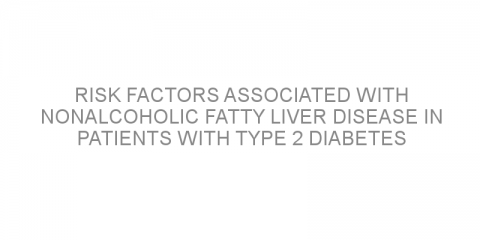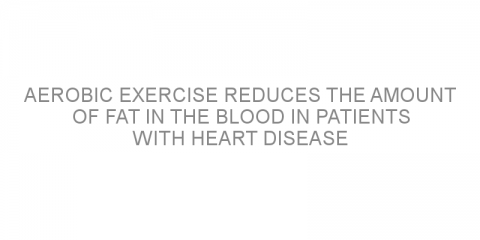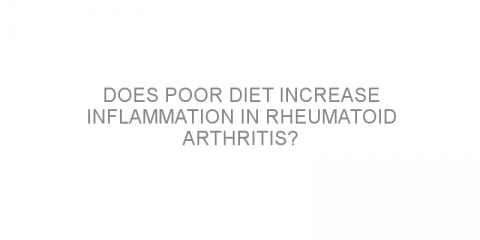In a nutshell This study aimed to see if the DASH diet (Dietary Approaches to Stop Hypertension) could reduce the risk of stroke. The main finding of the study was that adherence to the DASH decreased the risk of stroke. Some background The Dietary Approaches to Stop Hypertension (DASH) diet was developed in 1997. It consists of 8 components: high...
Read MoreLifestyle Posts on Medivizor
Risk factors associated with nonalcoholic fatty liver disease in patients with type 2 diabetes
In a nutshell The aim of this study was to investigate the occurrence of nonalcoholic fatty liver disease (NAFLD) in patients with type 2 diabetes (T2D). The main finding of the study was that T2D patients who are older, who smoke and have high body weight and diastolic blood pressure are more likely to develop NAFLD. Some background T2D is commonly...
Read MoreAerobic exercise reduces the amount of fat in the blood in patients with heart disease
In a nutshell The aim of this study was to investigate the relationship between aerobic exercise and fat in the blood (triglycerides) in patients with heart disease. The main finding of the study was that aerobic exercises reduced triglycerides in these patients. Some background It was previously thought that LDL cholesterol (bad cholesterol) was...
Read MoreHealthy eating patterns and cardiovascular disease: what are the benefits?
In a nutshell This study investigated if intermittent attempts to healthy eating improved cardiovascular disease (CVD) risk factors. They found that healthy eating reduced CVD risk factors. Some background Cardiovascular disease (CVD) can lead to serious events including heart attack, stroke, and death. Healthy eating plays an important role...
Read MoreIs there a better time to reduce basal insulin before exercise to prevent hypoglycemia?
In a nutshell The aim of this study was to compare three different times to decrease basal insulin to reduce hypoglycemia after exercise in patients with type 1 diabetes. The main finding of the study was that reducing basal insulin by 80% up to 40 minutes before exercise still did not reduce exercise-induced hypoglycemia. Some background Insulin is...
Read MoreLower fat diet associated with diabetic eye disease in type 1 diabetes
In a nutshell This study aimed to look at the differences in the diets of people with type 1 diabetes (T1D) with and without diabetic retinopathy (DR; eye damage). The main finding of the study was that a higher fat intake was associated with lower frequency of DR. Some background DR is a type of eye disease that can occur in patients with T1D. If it...
Read MoreHigh magnesium in the diet is associated with lower rates of heart disease in patients with type 2 diabetes
In a nutshell This study aimed to investigate the relationship between magnesium and the risk of heart disease in type 2 diabetes (T2D). The main finding of the study is that higher magnesium intake, a higher rate of magnesium removal from the body and higher blood magnesium levels were associated with lower rates of heart disease in T2D. Some...
Read MoreFunctional foods can alter gut bacteria to improve blood sugar control in type 2 diabetes
In a nutshell The aim of this study was to investigate if changes in diet can affect gut bacteria and improve blood sugar control in type 2 diabetes. The main finding of the study was that a shift in diet changes the abundance of different types of gut bacteria, improves blood sugar control and cholesterol levels in these patients. Some background...
Read MoreHow does diet affect heart health in type 1 diabetes?
In a nutshell The aim of this study was to investigate the association between markers of heart health and diet quality in patients with type 1 diabetes. The main finding of the study was that diets that included whole grains, whole fruits, added sugar and poly-unsaturated fats may affect heart health. Some background Patients with type 1 diabetes...
Read MoreVitamin C supplementation can decrease blood sugar levels and blood pressure in patients with type 2 diabetes
In a nutshell The study investigated whether taking an ascorbic acid (vitamin C) supplement can improve blood sugar control and blood pressure in patients with type 2 diabetes (T2D). The study found that vitamin C supplementation decreased blood sugar levels and lowered blood pressure in these patients. Some background Ascorbic acid (AA) is also known...
Read MoreCan certain herbs and spices help improve blood pressure control?
In a nutshell This study investigated if herbs and spices can help control blood pressure in patients with hypertension. They found that herbs and spices may reduce blood pressure in patients with hypertension. Some background Hypertension or high blood pressure (BP) is a serious medical condition. Managing hypertension is very important as it...
Read MoreDoes poor diet increase inflammation in rheumatoid arthritis?
In a nutshell This study investigated if diet quality was associated with disease activity in patients with rheumatoid arthritis. They found that patients with poor diet had higher levels of inflammation. Some background Rheumatoid arthritis (RA) is a chronic (long-term) condition. It is an auto-immune disease. In RA, the immune system attacks...
Read More













